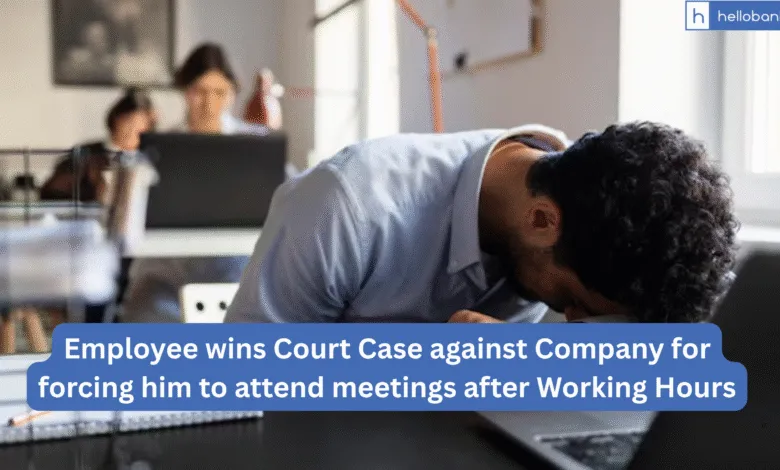Employee wins Court Case against Company for forcing him to attend meetings after Working Hours

A court in Beijing, China has ruled in favor of a man who sued his former employer for forcing him to attend online training sessions after official work hours, recognizing it as overtime work. The case, widely reported by Workers’ Daily on July 17, has sparked national conversation and is being hailed as a landmark decision for workplace rights in China.
What the Case Was About
The man, known only as Wang, joined an engineering company in Beijing in July 2020 and worked until June 2023, when he was let go. Frustrated by repeated demands to attend training sessions outside working hours, Wang filed a legal complaint. He demanded over 80,000 yuan (around Rs 9.6 lakh or USD 11,000) in unpaid overtime compensation.
Wang stated that the company made it mandatory to attend virtual training sessions through platforms like DingTalk (Ding Ding) and WeChat even after official work hours. If employees failed to attend, they were asked to make a “voluntary donation” of 200 yuan (around Rs 2,400 or USD 28) — which Wang argued was a form of indirect punishment.
To support his claim, Wang submitted screenshots of his training logs and chat messages with coworkers. However, when he first approached an arbitration authority, his claim was denied, prompting him to take the issue to court.
Company’s Defense: “No Real Work Was Done”
The company pushed back, claiming:
- These sessions were not official overtime as no prior approval had been given.
- Employees were only required to log in, not speak or actively participate.
- Workers could even choose not to listen, so technically, no work was being done.
- The donation policy had nothing to do with the training sessions.
China Court’s Verdict: After-Hours Training Is Overtime
The case was heard by the Beijing No. 2 Intermediate People’s Court, which carefully reviewed the evidence and ruled in Wang’s favor. The court found that:
- The training clearly took place after working hours.
- Employees were not free to decline participation.
- The threat of a donation showed that attendance was effectively mandatory.
- Even if the sessions were passive, they still interfered with personal time, which qualifies as overtime under labor laws.
The court added that just logging into a meeting after hours counts as work, especially when employees feel obligated to do so.
While the court did acknowledge that Wang had joined some sessions late, it still ruled that he was entitled to compensation. The company was ordered to pay Wang 19,000 yuan (around Rs 2.3 lakh or USD 2,600) in overtime wages.
Why This Decision Matters
This ruling is being described as historic by experts and media outlets. The government-run portal gmw.cn praised the court’s decision, calling it a strong message against “hidden overtime” — a rising issue in today’s digital work culture.
The editorial highlighted how modern communication tools like messaging apps allow work to intrude into employees’ personal time, often without formal acknowledgment or pay. It stated, “Even when employees are not in the office, a single message can pull them back into work. This kind of hidden overtime should not be ignored by the law.”
A Step Toward Work-Life Balance
This case shows an important problem many people face today — work and personal life are getting mixed up because of online meetings, work messages, and remote working tools. Many employees feel like they are never truly “off duty.”
The court’s decision clearly says that any work done after office hours must be treated as extra work, and the employee should be paid for that time. Personal time is important, and companies must respect it.
As more people work from home or in flexible jobs, this judgment can be an example for companies around the world. It reminds employers that just because someone is working remotely, they should not be expected to be available all the time.
Companies should try to support a healthy balance between work and personal life. They should avoid giving tasks, sending messages, or arranging meetings after office hours unless it is urgent. Respecting employees’ time helps them stay happy, focused, and productive at work.
